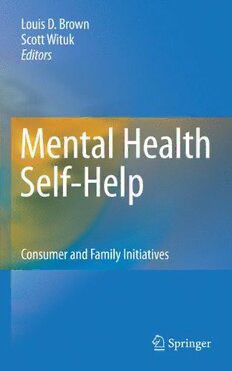
Mental Health Self-Help: Consumer and Family Initiatives PDF
368 Pages·2010·3.1 MB·English
Most books are stored in the elastic cloud where traffic is expensive. For this reason, we have a limit on daily download.
Preview Mental Health Self-Help: Consumer and Family Initiatives
Description:
Building on earlier patient-empowerment movements, consumer- and advocate-driven mental health self-help (MHSH) initiatives currently outnumber traditional mental health organizations. At the same time, this apparent success raises significant questions about their short-term efficacy and their value to lasting recovery.Mental Health Self-Help assembles the state of the evidence on the effectiveness of MHSH, beginning with the individual and larger social factors behind the expansion of consumer-directed services. Clearly organized and accessibly written, the book traces the development and evolution of MHSH as both alternative and adjunct to traditional mental health structures, offers research-based perspectives on the various forms of MHSH, and identifies potential areas for consumer initiatives to work with—and help improve—mental health systems. Contributors weigh strengths and limitations, raise research and methodology questions, and discuss funding and training issues to give readers a deeper understanding of the field and an informed look at its future impact on mental health treatment. Individual chapters cover the spectrum of contemporary self-help initiatives in mental health, including: • Online mutual aid groups.• Consumer-run drop-in centers.• Family and caregiver groups.• Certified peer support specialists.• Consumer advocacy initiatives.• Technical assistance organizations.• Professional/self-help collaborations.Mental Health Self-Help is a bedrock guide to an increasingly influential aspect of the mental health landscape. Researchers studying these initiatives from a variety of fields including community and clinical psychology, and public health—as well as clinicians, counselors, social workers, case managers, and policymakers—will find it an indispensable reference.
See more
The list of books you might like
Most books are stored in the elastic cloud where traffic is expensive. For this reason, we have a limit on daily download.
